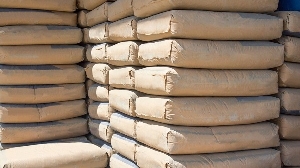Chamber of Cement Manufacturers, Ghana (COCMAG) has raised serious concerns about the newly-proposed Ghana Standards Authority’s (Pricing of Cement) Regulations, 2024 (L.I.).
The Chamber is of the strong conviction that while the Director-General of the Ghana Standards Authority (GSA), Prof. Alex Dodoo, and some within Parliament portray the L.I. as a mechanism to ensure transparency in the industry, it is an attempt at price control.
A statement issued in Accra by the Chamber said the crux of the issue lies in regulations 3(4), 3(5), and 3(6) of the L.I.
These provisions, it said, empowered a government committee of scientists at the Ghana Standards Authority to reject a cement producer’s reported price without explanation or a chance to appeal.
Furthermore, it said producers were prohibited from selling cement unless the committee approves their price. Non-compliance can lead to licence suspension.
“While price transparency is a laudable goal, the proposed regulations raise concerns about who wields the price control power. The price control committee (PCC) is composed primarily of six scientists, led by Prof. Dodoo, a pharmacist,” the statement said.
It said, “While their expertise in ensuring quality standards is undoubted, one wonders if a committee dominated by scientists possesses the nuanced understanding of market dynamics critical for setting a fair price for a complex commodity like cement. Can they effectively balance production costs, globally- and locally-traded inputs, and the long-term health of Ghana’s cement industry, better than the free market?”
The Chamber bemoaned the lack of consultation in the build-up to the drafting of the bill.
“While some might suggest a meeting was planned, the facts paint a different picture. Cement companies were summoned via a last-minute WhatsApp message on a Sunday evening for a meeting the following morning, with no agenda provided,” it said.
The statement said, “Upon arriving for the meeting, CEOs were surprised to find the media present, raising concerns about transparency and potential media misrepresentation. Ultimately, the CEOs were informed that the minister was unavailable to meet them.”
The Chamber said despite the narrative of profiteering, Ghanaians needed to be aware of the challenges the cement industry faced. The cedi depreciation by 104 per cent since 2022, the statement said, has significantly increased production costs, with 77 per cent of cement inputs being dollar-denominated.
Despite the problem of depreciation, the statement said, the industry had stood by Ghanaians in this difficult period and only raised prices by 48 per cent in the same period, absorbing a significant portion of the cost increases.
“Without this absorption, the price of cement should have been $2.30/bag (GHS 35/bag) higher than it is. Ghanaians deserve to know that their cement industry is one of the most competitive in West Africa, boasting of one of the highest numbers of manufacturers among regional peers,” it said.
Ghana’s 14 individual producers, the statement said, outnumbered Nigeria’s 12 and Togo’s five.
Ghana’s cement prices, it said, were among the lowest in West Africa, although 30 per cent of the cost build-up is paid to the government in taxes, levies, and service charges.
The minister’s actions, it said, were unfair and not in the best interest of Ghanaians.
“While other sectors have experienced higher price increases, the cement industry is singled out for control,” it said.
The current approach, the statement said, could lead to reduced production and shortages if the government-imposed price did not cover production costs, and manufacturers might be forced to reduce production, hindering construction projects.
The statement also cited job losses as another problem as reduced production could lead to job losses within the cement industry and related sectors.
“Without the ability to determine a fair market price, investors are less likely to invest in expanding production capacity, potentially leading to future shortages,” the statement said.
“COCMAG is not alone in its opposition to this L.I. Several professional bodies have spoken out, including the Ghana Chamber of Construction Industry, GREDA, Importers and Exporters Association of Ghana, the consumer protection organisation, CUTS International, all expressing concerns about the proposed regulations’ impact on the industry and ultimately, Ghanaian consumers,” the statement said.
On the way forward, COCMAG urged the government to reconsider this heavy-handed approach and engage in constructive dialogue with the industry.
“Transparency in cost structure, a focus on long-term solutions like promoting local sourcing of raw materials, and open communication are key elements for ensuring a sustainable and affordable cement supply for Ghana,” it said.
Click to view details



Business News of Thursday, 11 July 2024
Source: ghanaiantimes.com.gh

















